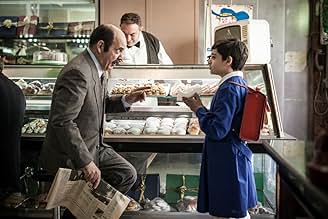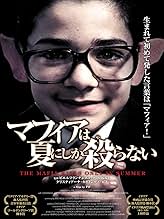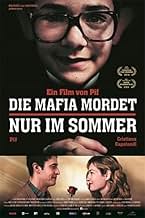PUNTUACIÓN EN IMDb
7,1/10
9,2 mil
TU PUNTUACIÓN
Inspirada en hechos reales, esta es una comedia negra sobre 20 años de historia de Sicilia desde la década de 1970 hasta la de 1990, burlándose de los jefes de la mafia y restaurando la gene... Leer todoInspirada en hechos reales, esta es una comedia negra sobre 20 años de historia de Sicilia desde la década de 1970 hasta la de 1990, burlándose de los jefes de la mafia y restaurando la generosidad de los héroes de Antimafia.Inspirada en hechos reales, esta es una comedia negra sobre 20 años de historia de Sicilia desde la década de 1970 hasta la de 1990, burlándose de los jefes de la mafia y restaurando la generosidad de los héroes de Antimafia.
- Premios
- 15 premios y 20 nominaciones en total
Antonino Bruschetta
- Fra Giacinto
- (as Ninni Bruschetta)
Reseñas destacadas
Don't expect "The Godfather" or Goodfellas" as this is supposed to be a comedy. Although can be quite bloody in parts.
The acting was ok but not terrific.
I can see this movie appealing to the country of origin but it does not hold up outside there.
The comedy was there but doesn't really come off most of the time.
The acting was ok but not terrific.
I can see this movie appealing to the country of origin but it does not hold up outside there.
The comedy was there but doesn't really come off most of the time.
Directed by and starring TV personality Pierfrancesco Diliberto (Pif), the mix of comedy, childhood reminiscence and documentary reconstruction of Mafia killings in Palermo during the 1970s seems like an unusual mix, but The Mafia Kills Only In Summer would go on to win several film awards and be developed subsequently into a TV series.
There are two halves to the film, the first half dealing with the early childhood of Arturo (Alex Bisconti), his love for a new girl Flora, and his growing awareness as a child of the influence that the Mafia have over the everyday lives of the citizens of Palermo in Sicily. The second half, stars the director Pif as Arturo, now a grown man aspiring to be a journalist, still dreaming of his true love Flora as she reappears in his life, and with the events that would eventually lead to the decline of the Mafia's stranglehold over the city.
Both parts of the film have their own attractions. The first half has some moments of childhood whimsy and comic overplaying, a bit like the cinema fixation of Cinema Paradiso, only for Arturo the fascination is an unusually strange devotion to the Italian Prime Minister Giulio Andreotti. The second half mixes romantic comedy with Arturo and Flora's involvement in politics and journalism, which presents some unlikely contrasts alongside the increase in violence and assassination by mafiosi under pressure from the authorities.
In the end it's those connections to what is happening in the real-world that succeed and validate the films approach. It not only gives a real sense of what it means to have grown up in Sicily during those times, the strangeness of the times contributing to a strange view of the world for a young child, but it also manages to pay tribute to those who fought against the Mafia and paid for it with their lives. The style might seem incongruous and exaggerated, but it seems a genuine response to the times and the people who lived through them, and - just as importantly - it has an easy approach that ensures that its message is able to reach out to a wide mainstream audience.
There are two halves to the film, the first half dealing with the early childhood of Arturo (Alex Bisconti), his love for a new girl Flora, and his growing awareness as a child of the influence that the Mafia have over the everyday lives of the citizens of Palermo in Sicily. The second half, stars the director Pif as Arturo, now a grown man aspiring to be a journalist, still dreaming of his true love Flora as she reappears in his life, and with the events that would eventually lead to the decline of the Mafia's stranglehold over the city.
Both parts of the film have their own attractions. The first half has some moments of childhood whimsy and comic overplaying, a bit like the cinema fixation of Cinema Paradiso, only for Arturo the fascination is an unusually strange devotion to the Italian Prime Minister Giulio Andreotti. The second half mixes romantic comedy with Arturo and Flora's involvement in politics and journalism, which presents some unlikely contrasts alongside the increase in violence and assassination by mafiosi under pressure from the authorities.
In the end it's those connections to what is happening in the real-world that succeed and validate the films approach. It not only gives a real sense of what it means to have grown up in Sicily during those times, the strangeness of the times contributing to a strange view of the world for a young child, but it also manages to pay tribute to those who fought against the Mafia and paid for it with their lives. The style might seem incongruous and exaggerated, but it seems a genuine response to the times and the people who lived through them, and - just as importantly - it has an easy approach that ensures that its message is able to reach out to a wide mainstream audience.
This is a pretty little movie about Italian mafia made by Palermo's own Pif, famous Italian TV personality who grew up experiencing most of the events dramatized in the film. The story is nice and makes fun of the mafia while avoiding to minimize the huge problem it was and it is even today. Too bad the good aspects end here. The main problem here are the actors: almost every actor in the movie performed poorly, and I guess most of them aren't actors at all. This could be good if the "non- actors" would have had smaller or easier parts, but as it is, it doesn't work at all. Sorry to say the biggest letdown were the kids. There is a constant amateur vibe and continuous poor delivery of performances. The directing is better but still quite mediocre, and do very little to compensate the dreadful actors.
Honestly, it started off fairly cute and fun. The young cast were great.
But it meandered to nowhere. Pointless. Try hard.
Interesting if you are a student of the Cosa Nostra, but otherwise give this mess a miss.
But it meandered to nowhere. Pointless. Try hard.
Interesting if you are a student of the Cosa Nostra, but otherwise give this mess a miss.
Director/writer/actor Pif (Pierfrancesco Diliberto), a famous Italian television personality, brings his story he wrote with Michele Astori and Marco Martanito the screen with a terrific degree of freshness in dealing with a subject that has always been subterranean and dark - the Mafia of Palermo, Sicily. Working on what appears to be a tight budget as far as cast and crew are concerned Diliberto brings this little gem to life in a most memorable manner.
The story is based on facts - but lightened with a fine sense of comedy that make the facts seem even more brutal: the dichotomy between the history and the comedic translation is intentional. The story begins with the inception of Arturo (Diliberto once he has grown to a man) in an inventive marriage of computer generated graphic art and reality based activity. From birth through twenty years we follow Arturo as a child as he views the workings of the Mafia and that intuitive response or observation follows him through young life into the position of a young man deeply infatuated with his girlfriend Flora. The charm of Arturo's coming of age is balanced by the film's mocking Mafia Bosses and restoring the generosity of the heroes of the Anti-mafia. The period was a time of 'see no evil/hear no evil' in Palermo, a city where denial was coupled with stifled tolerance, as the now infamous war for Mafia supremacy filled the air (and the streets) was accompanied by regular assassinations of rival mobsters and anti-Mafia crusaders.
Despite the potentially grim subject, the film is paced (or laced) so gently that the overriding effect is about love in a time of chaos managed beautifully by Pierfrancesco Diliberto. It sparkles like the beauty of the waters surrounding Sicily. In Italian with English subtitles.
The story is based on facts - but lightened with a fine sense of comedy that make the facts seem even more brutal: the dichotomy between the history and the comedic translation is intentional. The story begins with the inception of Arturo (Diliberto once he has grown to a man) in an inventive marriage of computer generated graphic art and reality based activity. From birth through twenty years we follow Arturo as a child as he views the workings of the Mafia and that intuitive response or observation follows him through young life into the position of a young man deeply infatuated with his girlfriend Flora. The charm of Arturo's coming of age is balanced by the film's mocking Mafia Bosses and restoring the generosity of the heroes of the Anti-mafia. The period was a time of 'see no evil/hear no evil' in Palermo, a city where denial was coupled with stifled tolerance, as the now infamous war for Mafia supremacy filled the air (and the streets) was accompanied by regular assassinations of rival mobsters and anti-Mafia crusaders.
Despite the potentially grim subject, the film is paced (or laced) so gently that the overriding effect is about love in a time of chaos managed beautifully by Pierfrancesco Diliberto. It sparkles like the beauty of the waters surrounding Sicily. In Italian with English subtitles.
¿Sabías que...?
- CuriosidadesAll the major political, judicial and criminal figures depicted are real people. However, Jean Pierre and his television show, "Bonsuaro - Lo show dei palmeritani", are fictional.
- PifiasArturo and Flora meet in the graveyard. It is supposedly 28th of July, 1983, a day before judge Chinnici was murdered. A gravestone of a person died in 1988 is seen in the background.
- ConexionesSpin-off La mafia sólo mata en verano (2016)
Selecciones populares
Inicia sesión para calificar y añadir a tu lista para recibir recomendaciones personalizadas
- How long is The Mafia Kills Only in Summer?Con tecnología de Alexa
Detalles
- Fecha de lanzamiento
- País de origen
- Sitio oficial
- Idioma
- Títulos en diferentes países
- La màfia només mata a l'estiu
- Localizaciones del rodaje
- Empresas productoras
- Ver más compañías en los créditos en IMDbPro
Taquilla
- Recaudación en Estados Unidos y Canadá
- 37.134 US$
- Recaudación en todo el mundo
- 6.782.571 US$
- Duración
- 1h 30min(90 min)
- Color
- Mezcla de sonido
- Relación de aspecto
- 1.85 : 1
Contribuir a esta página
Sugerir un cambio o añadir el contenido que falta


























